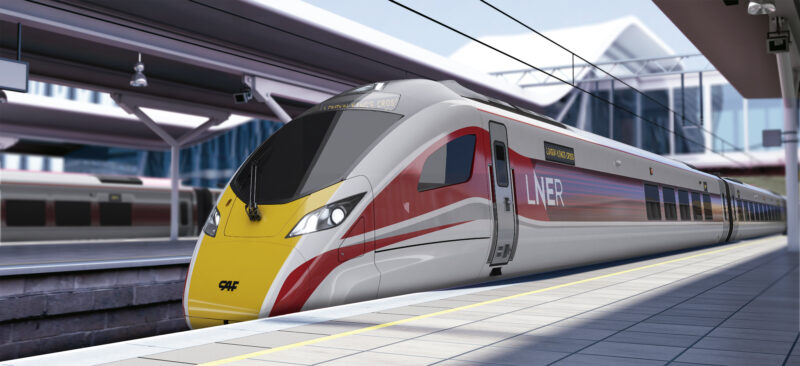There’s movement in the rolling stock market as London North Eastern Railway (LNER) has tapped Construcciones y Auxiliar de Ferrocarriles (CAF) for new trains.
CAF was the successful bidder to deliver a fleet of 10 new tri-mode trains for LNER. Porterbrook has been chosen as the financier of the new fleet in a deal valued at £500 million.
The trains will be able to operate in electric, battery or diesel mode (a tri-mode train). This will offer benefits including reduced pollution, lower maintenance and operating costs, as well as leading-edge technology.
Bi-Modal trains have been in vogue to provide overhead electrical power pickup as well as diesel power when away from the wires. Battery technology will assist in reducing the need to use diesel traction in areas where overhead powerlines are not available.
The fleet of 10 trains will be configured in a 10-car configuration, supporting the existing Azuma (Class 800 and Class 801 trains). They are based on CAF’s Civity UK platform and are to be assembled at CAF’s facilities in Wales.
In Quotes
David Horne, Managing Director at LNER, said:
“Successfully delivering this new fleet is an integral part of LNER’s Business Plan. Our focus is ensuring we create a fleet that truly matches the needs of all our customers, with clear targets on setting new standards for comfort, accessibility, and exceptional customer service.”
Rail Minister, Huw Merriman, said:
“Replacing ageing rolling stock is crucial to the sustainability, reliability and growth of our rail network, and I’m delighted passengers travelling on LNER services will benefit from improved services and greener journeys on these modern trains.
“Private sector investment plays an important role within the UK rail industry and this order will help drive economic growth across the country while supporting skilled jobs.”
Richard Garner, CAF UK Director, said:
“The new CAF fleet of more sustainable and environmentally friendly tri-mode trains will reduce carbon emissions, noise and vibration pollution and optimise energy consumption while increasing service operation efficiency and performance on the East Coast Main Line.”
Mary Grant, Porterbrook CEO, said:
Porterbrook is delighted to fund and take ownership of this state-of-the-art new tri-mode fleet for LNER, supporting its focus on creating a world-class service that matches the needs of customers with lower emission trains.”
Another win for CAF
It’s another win for CAF which has been building market share with a mixture of diesel and electric trains being delivered in the United Kingdom (including the Class 195, Class 196, and Class 197 diesel trains, and also the Class 331 and Class 397 electric trains.
Of course – there are no details of when the fleet will be delivered, but there are some things we can work out.
Given that these will be targeting “older trains”, it is safe to assume the existing Intercity 225 (Class 91 and Mark IV Rolling Stock) trains could well be in their last years on the East Coast Main Line.
In addition, it is surprising Hitachi (who have at this point sewn up the long-range intercity train market) didn’t win this tender – be it on a technology or cost ground, which would have aided in fleet compatibility.
We’ll have to see what these new trains bring in the future.
Welcome to Economy Class and Beyond. Your no-nonsense guide to network news, honest reviews, in-depth coverage, unique research, as well as the humour and madness I only know how to deliver.
Our Social Media pool has expanded. You can find us across most networks as @economybeyond on Twitter, Mastodon, BlueSky, Threads and Instagram!
Also, remember that we are part of the BoardingArea community, bringing you the latest frequent flyer news from around the world.
